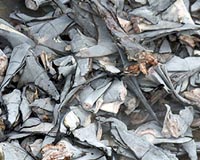| . |  |
. |
Guam (SPX) Apr 13, 2011 Mohammad Golabi, a soil science professor at the University of Guam, has put his years of research on vetiver grass to practical use in shielding the reefs in Pago Bay from the harmful effects of construction-induced run-off. One of the major health hazards facing Guam's reefs is soil erosion resulting in sedimentation and suffocation of the complex organisms that make up a reef system. "Vetiver's ability to tolerate high stress situations, adapt to a variety of conditions, develop a dense vertical root system, and powerful soil binding characteristics make it an ideal candidate for controlling soil erosion," says Golabi. Vetiver grass has a spongy root system that binds the soil beneath the plant to a depth of up to 3 meters forming a dense underground curtain that prevents gullying and tunneling. Once the hedge has been established, it can live up to 50 years and does not require further maintenance other than periodic trimming. With the right conditions thick hedges can be formed within one year of planting, but it generally takes two to three growing seasons to establish a hedge dense enough to withstand torrential rains and protect the shoreline from sedimentation. In this pilot project, Golabi in cooperation with the developers planted vetiver grass along a Pago Bay beach area adjacent to a tract of land that had been cleared for a new housing project. Fully developed vetiver seedlings were planted in contour rows along the beach without disturbing the aesthetics of the area. The plants established in a few months, forming a thick hedge that prevents sediment from water-borne erosion from flowing into the ocean. "It is also expected that these vetiver hedges may even be able to protect the beach area against tidal surge once their root systems are well established. These hedgerows clearly demonstrate that the vetiver grass system is a unique, economical and effective bioengineering technology for protecting coral reefs from further degradation in the Pago Bay area and may be applied to other sites around the island," says Golabi.
Share This Article With Planet Earth
Related Links University of Guam Water News - Science, Technology and Politics
 Hong Kongers back weddings without shark fin soup
Hong Kongers back weddings without shark fin soupHong Kong (AFP) April 12, 2011 Almost 80 percent of Hong Kongers now consider it socially acceptable to leave shark fin soup off the menu for a wedding banquet, a survey by a shark conservation group said Tuesday. Some 78 percent in the south Chinese financial hub believe it is allowable not to offer the coveted fins at a wedding, a survey by the nonprofit group BLOOM said - a small sign of hope in efforts to protect the ... read more |
|
| The content herein, unless otherwise known to be public domain, are Copyright 1995-2010 - SpaceDaily. AFP and UPI Wire Stories are copyright Agence France-Presse and United Press International. ESA Portal Reports are copyright European Space Agency. All NASA sourced material is public domain. Additional copyrights may apply in whole or part to other bona fide parties. Advertising does not imply endorsement,agreement or approval of any opinions, statements or information provided by SpaceDaily on any Web page published or hosted by SpaceDaily. Privacy Statement |